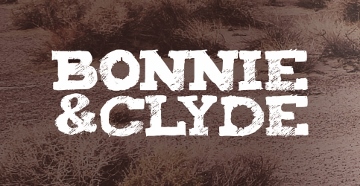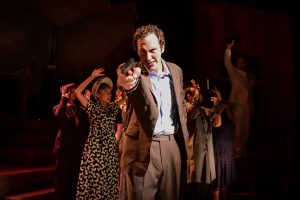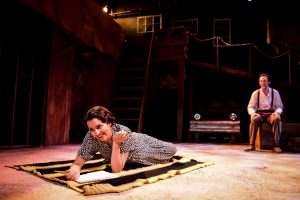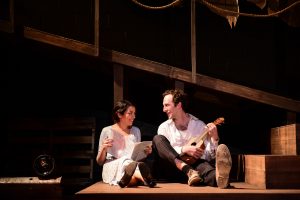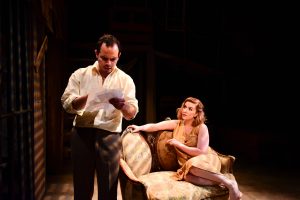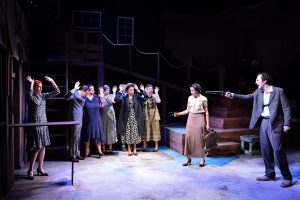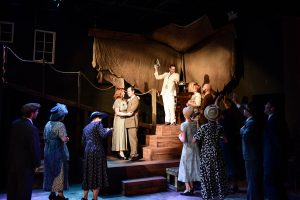SYMPATHY FOR SCUMBAGS
How can two white-trash lovers—“small town nobodies,” as the press release puts it—“search for meaning at the height of the Great Depression”? Patronize a soup kitchen, sell apples, get a job, hope for a “new deal”? Naw—that’s suckers’ stuff. How about robbing stores and banks, shooting to death a dozen folks (cops and civilians), writing wretched poetry, posing with their machine guns alongside their speedy hot-rod (an 80-mph Ford), and, unlike Robin Hood, giving their ill-gotten gains to the no longer poor—themselves?
That, and a sneaky ambush by the feds, was enough to make Bonnie Parker, who wanted a career like Hollywood vamp Clara Bow (the “’It’ Girl”), and Clyde Barrow, who envied Al Capone his thug life, “heroes” in hard times, martyrs of the John Dillinger or Billy the Kid caliber. Thanks to a certain film starring Warren Beatty and Faye Dunaway, in 1967 they won new fame. And now…
A 2011 Broadway flop, Bonnie & Clyde, with music by Frank (Jekyll and Hyde) Wildhorn, book by Ivan Menchel and lyrics by Don Black, celebrates the outcast outlaws. Twenty peppy rockabilly/gospel/blues songs mark their “short but lovin’” lives and soft-pedal their bullet-ridden reckoning on a lonely Louisiana road on May 23, 1934. Now at Theater Wit, Kokandy Productions’ doggedly dedicated 150-minute staging by Spencer Neiman honors the show’s “sympathy for the devil” with a persuasive Chicago premiere, its misguided empathy for evil notwithstanding.
We’re to believe that only when they rip off everyone around them can Bonnie and Clyde live life to the fullest. A still-married West Texas waitress with celluloid fantasies (“Picture Show”), 20-year-old Bonnie (Desiree Gonzalez) meets a jailbreaking Clyde (Max DeTogne) in 1930 when he offers to repair her car for a lift to Dallas. The fateful encounter between two drifting dreamers (“This World Will Remember Me”) triggers a spree-killing anti-romance. Trapped by sixteen years of bad-boy behavior (including purportedly killing a fellow con who raped him), Clyde argues that he just can’t earn an honest living: The authorities keep messing with the jailbird’s job prospects. Besides, as they say in Texas, some folks just need killing.
Clyde’s rat-a-tat-tat reign of terror includes his dumbass, gangster-wannabe brother Buck (Cisco Lopez) and his respectability-craving, Bible-thumping wife Blanche (Missy Wise), whose anguished ambivalence about her hubbie’s “get rich” schemes is as psychologically probing as the musical gets. The odd man out is nice-guy deputy Ted (Patrick Tierney), Bonnie’s childhood chum(p) who pines for her damaged goods (“You Can Do Better Than Him”). A preacher (Nathan Carroll) arrives to remind us that “God’s Arms Are Always Open,” a lesson lost on two very mean kids.
What follows, of course, are increasingly brazen robberies, the gruesome twosome meting out frontier justice to anyone “trying to be a hero.” Proclaiming that “freedom is something I gotta steal,” Bonnie is delighted that the tabloids proclaim her a “bewitching brunette.”
Nicely shaped by music director John Cockerill, Wildhorn’s always suitable songs often rise to their sordid occasions, notably Bonnie’s early, winsome anthem “How ‘Bout a Dance?”. But just as often, they marinate in amoral resignation (the gun-crazed couple’s “You Love Who You Love”). Aubrey Adams’ country-cooked choreography pumps up the rousers that punctuate the mayhem. After Clyde’s first-act finale, the understated “Raise A Little Hell,” the second act offers the ensemble’s “Made in America,” a paltry but relevant rationale.
Realizing it’s “Too Late To Turn Back Now,” the larcenous lovebirds rampage down a predictable road to perdition. A questionable consolation gets served up in Bonnie’s unaffecting ballad “Dyin’ Ain’t So Bad.” On a rural road, as the deadly duo return to visit their parents, they get chewed up in a lead storm from hell.
As the star-crossed slaughterers, DeTogne and Gonzalez convey some chemistry and even charisma. Very much on display if not contagiously convincing, Kokandy’s hard work is non-negotiably noble. But by its strangely sentimental end, Bonnie & Clyde has romanticized two sociopathic soulmates and hillbilly hoodlums who deeply and sincerely earned an apotheosis in artillery.
photos by Evan Hanover
Bonnie and Clyde
Kokandy Productions
Theater Wit, 1229 W. Belmont Ave
Thurs-Sat at 8; Sun at 3
Sat at 3 (9/30, 10/7 & 10/14 only)
ends on October 15, 2017
for tickets, call 773.975.8150 or visit Kokandy
for more shows, visit Theatre in Chicago
